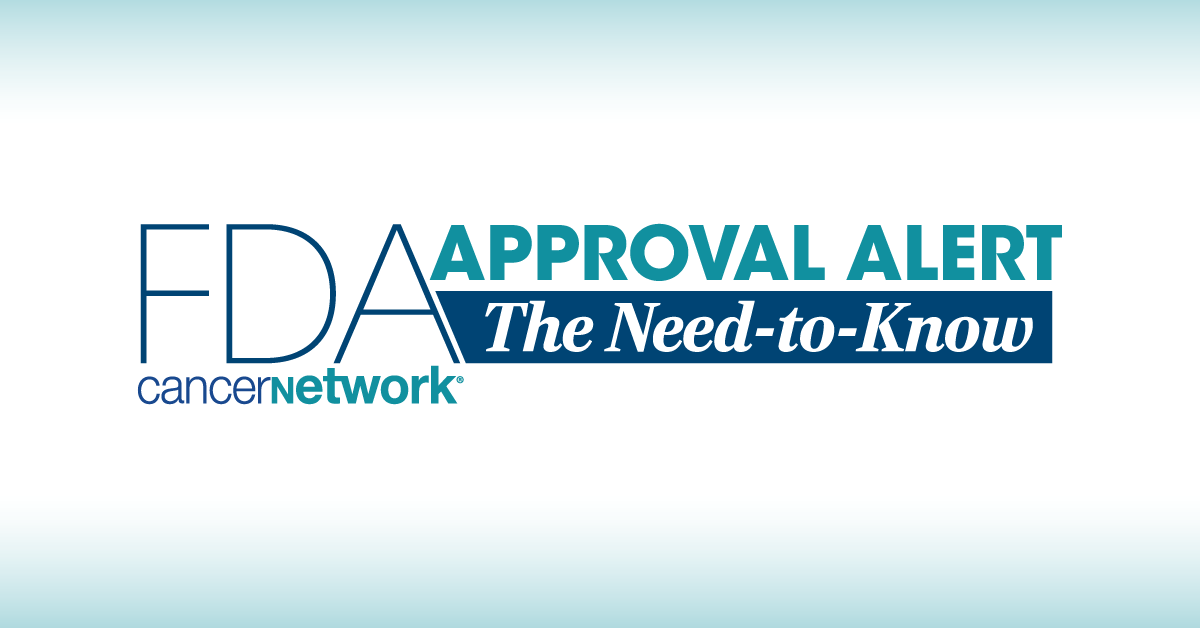FDA Approves Adagrasib/Cetuximab in KRAS G12C-Mutated CRC
Data from the colorectal cancer cohort of the KRYSTAL-1 trial support the accelerated approval of adagrasib/cetuximab in KRAS G12C–mutated disease.
The approval is based on results from the phase 1b/2 KRYSTAL-1 trial (NCT03785249), which assessed adagrasib monotherapy or in combination with cetuximab for patients with KRAS G12C–mutant advanced solid tumors.

The FDA has given accelerated approval to adagrasib (Krazati) plus cetuximab (Erbitux) for patients with KRAS G12C-mutated colorectal cancer (CRC), according to a press release from the organization.1
The approval is based on results from the phase 1b/2 KRYSTAL-1 trial (NCT03785249), which assessed adagrasib monotherapy or in combination with cetuximab for patients with KRAS G12C–mutant advanced solid tumors.2 Additionally, an FDA-approved test must be used to determine disease, and patients must have received prior treatment with fluoropyrimidine-, oxaliplatin-, and irinotecan-based chemotherapy to be eligible for treatment.
Topline data included an overall response rate of 34% (95% CI, 25%-45%) and a median duration of response of 5.8 months (95% CI, 4.2-7.6). Of note, 31% of patients had a duration of response lasting at least 6 months.
According to the data from the CRC cohort of the KRYSTAL-1 trial published in The New England Journal of Medicine, 44 patients had been given monotherapy, and 32 had been given combination therapy.3 In the monotherapy arm, patients were given adagrasib at 600 mg twice daily by mouth without food. In the combination arm, adagrasib was given intravenously at 600 mg twice daily, and cetuximab was given either once a week at 400 mg/m2 followed by 250 mg/m2, or every 2 weeks at 500 mg/m2.
The data cutoff was June 16, 2022, in the monotherapy arm, the median duration of follow-up was 20.1 months, and the median duration of treatment was 5.9 months. The median patient age was 59 years old, and 50% were women. For the combination arm, the median follow-up was 17.5 months. The median age was 60 years old, and 53% of patients were women.
In the adagrasib monotherapy arm, 43 patients were evaluable with a response rate of 23% (95% CI, 12%-39%) by blinded independent central review (BICR) and 19% (95% CI, 8%-33%) via investigator assessment. In the full analysis of 44 patients, the response rate by investigator assessment was 18% (95% CI, 8%-33%).
In the 44 patients, the median progression-free survival (PFS) was 5.6 months (95% CI, 4.1-8.3), and the median overall survival (OS) was 19.8 months (95% CI, 12.5-23.0).
In the adagrasib plus cetuximab arm, 28 patients were evaluable, and the response rate was 46% (95% CI, 28%-66%) by BICR and investigator assessment. In the full analysis of 32 patients, the investigators reported a response rate of 41% (95% CI, 24%-59%).
The median DOR was 7.6 months (95% CI, 5.7-not estimable), and the median time to response was 1.4 months. In the entire cohort, the median PFS was 6.9 months (95% CI, 5.4-8.1), and the median OS was 13.4 months (95% CI, 9.5-20.1). At the data cutoff, 47% of patients had started subsequent therapy, and 6 patients crossed over from the monotherapy to the combination arm.
Regarding safety in the monotherapy arm, treatment-related adverse effects (TRAEs) of any grade occurred in 93% of patients. The most common AEs included diarrhea (66%), nausea (57%), vomiting (45%), and fatigue (45%). Grade 3/4 TRAEs occurred in 34% of patients and included anemia (9%) and diarrhea (7%). Of note, 39% of patients had a dose reduction due to TRAEs; no patient discontinued treatment.
In the combination arm, TRAEs of any grade were observed in 100% of patients. They included nausea (62%), diarrhea (56%), vomiting (53%), dermatitis acneiform (47%), and fatigue (47%). Grade 3/4 TRAEs occurred in 16% of patients. TRAEs leading to a dose reduction of either treatment occurred in 31% of patients for adagrasib and 3% for cetuximab. A total of 16% of patients discontinued cetuximab due to TRAEs, and no patients discontinued adagrasib.
The FDA granted priority review to adagrasib/cetuximab for previously treated KRAS G12C–mutated CRC in February 2024.4
References
- FDA grants accelerated approval to adagrasib with cetuximab for KRAS G12C-mutated colorectal cancer. News release. FDA. June 21, 2024. Accessed June 21, 2024. https://tinyurl.com/2app6ahp
- Pant S, Yaeger R, Spira AI, et al. KRYSTAL-1: activity and safety of adagrasib (MRTX849) in patients with advanced solid tumors harboring a KRASG12C mutation. J Clin Oncol. 2023;41(suppl 36):425082. doi:10.1200/JCO.2023.41.36_suppl.425082
- Yaeger R, Weiss J, Pelster MS, et al. Adagrasib with or without cetuximab in colorectal cancer with mutated KRAS G12C. N Engl J Med. 2023;388(1):44-54. doi:10.1056/NEJMoa2212419
- U.S. Food and Drug Administration (FDA) accepts supplemental new drug application for KRAZATI (adagrasib) in combination with cetuximab as a targeted treatment option for patients with previously treated KRAS G12C-mutated locally advanced or... News release. Bristol Myers Squibb. February 20, 2024. Accessed May 8, 2024. http://tinyurl.com/ybhkrph4